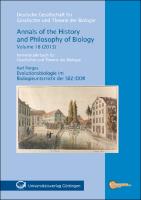Evolutionsbiologie im Biologieunterricht der SBZ/DDR
Author(s)
Porges, Karl
Collection
AG UniversitätsverlageLanguage
GermanAbstract
The scientific and public discussions over the last 200 years were shaped by findings from the field of evolutionary biology. Back in 1877, when Ernst Haeckel asked for the inclusion of evolutionary biology into class, he was met with fierce resistance (see Hoßfeld, 2010, p. 56). As Lässig (2010, p. 199) argues, knowledge is socially shaped. The aim of this study is to reveal the development of the significance as well as presentation of evolutionary biological contents in biology class within the SOZ/GDR and to embed it into the context of the respective prevailing political and social developments. Relevant curricula and schoolbooks as the most precise codification of the curricula fixed contents (see Neuner, 1989, p. 411) were used as raw material. For most subjects the history of schoolbooks is barely studied (see Pöggeler, 2003, p. 37). Therefore, as basis for this study, only one primary descriptive thesis about evolutionary biology in class (Rommel, 2006) could be used. Based thereupon an analytical framework will be introduced which follows a multidimensional approach of research by containing aspects of the three reference systems design, subject didactics and subject discipline. Product oriented separate and group analyses were used to evaluate the sources. This was carried out under the primacy of interdisciplinarity via analysis by content. The feedback of sociocultural changes on school books will be clarified in the concluding discussion. It will be shown that evolutionary contents occupied a significant position in biology classes within the SOZ/GDR and that the expression of those contents followed divergent approaches and preferences. The classification of teaching and learning material as an informational, pedagogical and political issue (see Stein, 1991) is taking place in the same context. Erkenntnisse aus den Bereichen der Evolutionsbiologie prägten wissenschaftliche und öffentliche Debatten der letzten 200 Jahre. Bereits 1877 forderte Ernst Haeckel ihre Einbindung in den Schulunterricht und stieß damit auf heftigen Widerstand (vgl. Hoßfeld, 2010, S. 56). Wie Lässig (2010, S. 199) darlegt, wird Wissen gesellschaftlich vorstrukturiert. Ziel der Arbeit ist es, die Genese von Stellenwert und Darstellung evolutionsbiologischer Inhalte im Biologieunterricht der SBZ/DDR aufzuzeigen sowie diese in den jeweils herrschenden Kontext politisch-gesellschaftlicher Entwicklungen einzubetten. Ausgangsmaterialien sind relevante Lehrpläne sowie Schullehrbücher als „konkreteste Kodifizierung des in den Lehrplänen fixierten Inhalts“ (Neuner, 1989, S. 411). Eine primär deskriptive Examensarbeit dient der Untersuchung als Grundlage, da die Geschichte des Schülerbuches bisher nur in wenigen Fachbereichen gründlich erforscht ist (vgl. Rommel, 2006; vgl. Pöggeler, 2003, S. 37). Darauf aufbauend wird ein Analyseraster vorgestellt, welches einem multidimensionalen Forschungsansatz folgend, Aspekte der Bezugssysteme Design, Fachdidaktik und Fachwissenschaft Biologie beinhaltet. Die Auswertung der Quellen erfolgt produktorientiert in Einzel- und vertikalen Gruppenanalysen unter dem Primat der Interdisziplinarität mittels inhaltsanalytischer Methoden. Bei der abschließenden Diskussion der Ergebnisse wird die Rückwirkung soziokultureller Veränderungen auf die Schulbücher verdeutlicht. Es wird gezeigt, dass evolutionsbiologischen Inhalten im Biologieunterricht der SBZ/DDR eine exponierte Stellung zukam, deren Darstellung divergenten Ansätzen und Präferenzen folgte. In diesem Zusammenhang erfolgt die Einordnung der Lehr- und Lernmaterialien als Informatorium, Pädagogikum und Politikum (vgl. Stein, 1991).
Keywords
schoolbooks; sociocultural; didacticDOI
10.17875/gup2018-1056ISBN
9783863953331OCN
1038389932Publisher
Universitätsverlag GöttingenPublication date and place
2018Classification
Biology, life sciences


 Download
Download